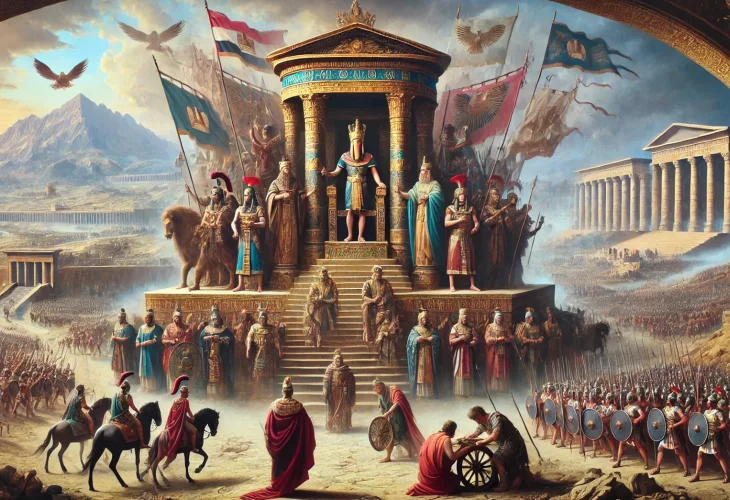The Unfinished Battle: Ptolemy III and the Threat to the Jews of Israel
Caught between a rock and a hard place, the Jews of ancient Israel faced increased taxes as Ptolemy III demanded more funds for his war campaigns, leading to widespread discontent.

In the year 246 BCE, 316 years before the destruction of the Second Temple, Ptolemy II, the ruler of Egypt and Israel, passed away. His son, Ptolemy III, ascended the throne. He began his 24-year career with warfare, continuing the trend throughout his reign. As long as Ptolemy II was alive, peace was maintained between the Greek kingdoms, successors of Alexander. Ptolemy ruled over Egypt and Israel, while Seleucus and his heirs governed Syria, Babylon, Persia, and the East. Ptolemy II had secured a promise from the Seleucid king that Princess Berenice would marry Ptolemy III, but following Ptolemy II's death, the promise was not fulfilled. As a result, Ptolemy III waged war on Syria to claim his promised wife.
Wars bring instability, more conflict, and significant expenses. The Jews of Israel found themselves caught between a rock and a hard place. Ptolemy III demanded higher taxes from them to fund his military campaigns, in which he "defended" his territory. While it was his legal right, it sparked great resentment. Conversely, the Seleucids sent envoys to the Sanhedrin to shift their support and gain substantial benefits. The High Priest Onias II, from the line of Zadok the Priest, whose descendants served generation after generation since the time of King David, believed the Seleucids would prevail and ceased the tax payment to Ptolemy. In response, Ptolemy dispatched a garrison with an ultimatum: if the taxes were not paid immediately, he would confiscate Jerusalem and divide it among his soldiers.
Into this tense situation stepped a competent yet unscrupulous man named Joseph from the Tobiads. The Tobiad family was a longstanding and respected Jewish family living in Transjordan. Joseph, already an appointee of the king in Transjordan, saw an opportunity. He sent a messenger to Ptolemy III, offering to collect the taxes of Israel, replacing the derelict High Priest. Joseph promised double the revenue. The financially pressured king agreed immediately, sending Joseph along with a detachment of two thousand soldiers to enforce the new arrangement. Joseph ben Tobiah thus became a formidable figure in Israel. With his troops, he imposed a tax on every landowner, vineyard, and individual of his choosing, without room for appeal or negotiation. It was money or facing the wrath of soldiers. Joseph held this position for twenty-two years, and the Jews of Israel realized that the Greeks were not simply benevolent overseers.
Meanwhile, the situation in Alexandria deteriorated. Under harsh conditions, it became increasingly difficult to uphold the commandments. Jews were compelled to integrate into Greek society. They ceased educating their children in Torah study and Hebrew language, resulting in Torah readings during Shabbat from Greek-written texts. They distanced themselves from traditional study houses, blending Greek ideas as interpretations of the Torah. Though well-intentioned, this left them far from the spirit of tradition. One of Alexandria's renowned scholars was Jedidiah, also known as Philo of Alexandria, about whom we've discussed on another occasion.
In 222 BCE, Ptolemy IV ascended to the throne of Egypt. He continued his father's path of warring against the Seleucid kingdom. These conflicts affected the inhabitants of Israel, with some battles taking place on its soil. One of the most famous was the Battle of Raphia. For five years, Ptolemy prepared for the grand confrontation against Antiochus III, dubbed "Antiochus the Great," the Seleucid king. In 217 BCE, they met at the coastal city of Raphia. Ptolemy approached from the south, leading an army of seventy thousand soldiers, six thousand horsemen, and seventy-three African elephants. Antiochus mobilized sixty-two thousand infantry, five thousand cavalry, and 102 Indian elephants. It marked the only historical occasion when two armies used two different elephant species.
Ptolemy decisively defeated Antiochus. Ten thousand of Antiochus's soldiers were killed, along with several elephants. He was forced to flee to avoid the destruction of himself and his forces. But Antiochus III was undeterred. For twenty years, the armies engaged in various battles, until in 202 BCE, Antiochus III defeated Ptolemy V, and Israel became part of the Seleucid empire.

